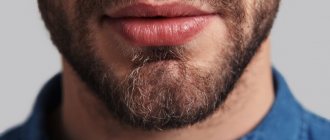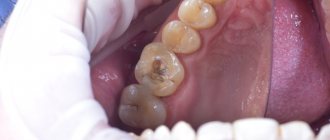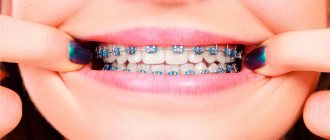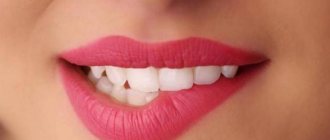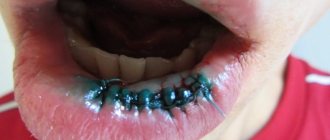The appearance of any negative habits in children is always a cause for concern for attentive parents. If a child bites his lower lip, this must be dealt with. But first you should find out the reason for such actions. This should not be ignored, since constant lip biting causes irritation, swelling, and even a rash around the mouth. This causes anxiety for the baby.
The baby constantly touches his hair or sucks his finger
If a baby regularly twirls a strand of hair around his hand, bites his nails, or sucks his finger, this indicates that he is under emotional stress. An unconscious action that he repeats over and over again gives the baby a feeling of calm and stability. Children often resort to this method when they are afraid of disappointing mom and dad.
If parents make excessive demands on their child and expect only the best results, it is vital for the child to calm down. He is afraid of not living up to the expectations that adults place on him. There is no one to ask for help, because parents will scold and say: “You are already an adult. Solve problems yourself”, “We are tired of doing everything for you”, “How many times can we repeat: we are busy!” If you say this to a child, think about what it would be like for him to hear such phrases from the person closest to him.
Marina, 23 years old:
“I sucked my thumb as a child. This continued for up to 6 years. From the age of three, my parents sent me to the figure skating section, my mother additionally taught me English, my father taught me to play chess. I didn’t have a childhood as such. Later I realized that I calmed down only when the finger was in my mouth. My parents scolded me for this habit, smeared mustard on my finger, and bandaged me. It would have been better, of course, if they had taken me to a child psychologist, but at that time this was not accepted. And my authoritarian mom and dad wouldn’t agree to see a doctor. It seemed to them that they were trying for my sake, but I didn’t need it. At the age of 6, the skin on my finger burst from constant sucking, it was very painful for me, but my parents never regretted it. On the contrary, they said that it was my fault. Now I hate chess and ice skating, and I will never force my children to do anything they don’t want.”
Tips for parents
There are several recommendations that will help you get rid of a bad habit:
- Show your child what it looks like when he bites his lip. He must understand that from the outside it looks ugly;
- come up with a reward system (for example: if the baby does not suck his lip for a week, parents take him to the zoo or to the attractions);
- lubricate your lips with something sharp, for example, aloe juice or mustard. This method should be used as rarely as possible. Otherwise, skin irritation or disturbances in the gastrointestinal tract will occur.
Sniffles, grunts, coughs
From early childhood, children understand that during illness, parents forget about their important, adult affairs and devote all their time to the sick child. As children get older, they may deliberately blow their nose loudly, cough, or sigh while pressing their hand to their forehead. At the same time, the little pretenders feel good, they just want to attract the attention of their parents. Children want to be pitied, shown care, hugged and given warm milk. This happens, as a rule, in families where parents are busy with their own affairs and do not want to spend time with their children.
Sometimes boys and girls “get sick” so as not to go to kindergarten/school. There are a number of reasons why they behave this way.
- The child feels uncomfortable in a group or class. Perhaps he has problems with one of his students or classmates, as well as a conflict with the teacher. If there is no trusting relationship with the parents, the child cannot honestly admit why he does not want to go to an educational institution. It’s easier for him to feign illness and stay home.
- Parents make excessive demands. Even though children are full of energy and strength, they can also get tired. They also need rest. If mom and dad don’t understand this, they have to resort to tricks.
- The child lacks parental attention. Kids need their parents to spend time with them: reading, playing, sculpting, drawing. Sometimes children want to be at home with mom or dad, instead of going to kindergarten/school.
A sick child receives the necessary dose of love and warmth. If you suspect that your son or daughter is pretending to be sick, look into the situation instead of immediately scolding the child.
Ksenia, mother of 6-year-old Dasha:
“My daughter rarely gets sick; her ailments can be counted on one hand. But in the last year, I began to notice that Dasha began to cough, sneeze and sniffle in the evenings. At first I rushed with a thermometer, they even called the pediatrician several times, although there were no obvious causes of the cold. The doctor said that the girl was fine. We underwent a full examination at the medical center, but all tests and indicators were normal. I did not connect Dasha’s condition with the fact that we moved and my daughter went to a new kindergarten.
It turned out that no one played with her in the group, she didn’t find any new friends, so she didn’t want to go there. But she was afraid to admit it, because my husband and I work, and she didn’t want to upset us. I blame myself for not talking to Dasha frankly, for not finding out the reasons why my daughter was making up illnesses. We work a lot, but no work is worth forgetting about the problems of children. Now Dasha goes to a private kindergarten. She immediately made friends in the group, and now every morning her daughter runs to kindergarten with joy.”
What you can do at home
If a child bites his lip, new bites constantly appear, what to do in this case? First you need to determine the cause of this condition. If the cause is constant chapping, you should purchase a hypoallergenic hygienic lipstick and apply it regularly. You can also moisturize your lips with other products approved for childhood.
If a girl has such a problem, the motivation to get rid of it may be to focus on her femininity and beauty, to give her a beautiful chapstick. She will paint her lips, creating protection for them.
If a boy has a problem, he can also lubricate his skin with cream. It has an unpleasant taste, this is what will become an incentive to stop such actions. You can also drink valerian or motherwort. With their help, sleep will improve and the baby will become calmer. It is very important to provide a favorable psychological environment at home.
Child bites lips
If you are talking to a baby, and he constantly bites his lips, perhaps the baby is afraid to say something unnecessary or forbidden. Perhaps the child is holding back with all his might so as not to give away some secret. Or he does not want to enter into an argument with his opponent, even if he does not agree with his point of view.
Important! If a baby bites his lip while doing something (for example, painting a picture or making a craft from plasticine), most likely he is simply focused and completely involved in the process.
Children bite their lips, as a rule, when parents constantly pull back, do not allow them to speak out, and do not take into account the opinions of younger family members. What should adults pay attention to?
- Try to control what you say to your son (daughter) even in those moments when you are very angry or angry.
- Constantly tell your child that you love him and that you are proud of his achievements. Try to avoid criticism and remarks that destroy warm relationships.
- Give children more freedom. Let them exercise independence, use imagination and creativity. If you do everything for your child, he will not gain invaluable life experience. And endless advice from parents only hinders the development of creative thinking.
Alena, 27 years old:
“My parents raised me in strictness. I was not allowed to express my thoughts, desires, my life was clearly planned by my mother and father. “Don’t argue with your elders”, “You must study well”, “No one asked you” - this is how they talked to me since childhood. Then I developed the habit of biting my lips. They crusted over, burst, and an itchy rash formed around them. The dermatologist prescribed some ointments and tinctures, but everything happened again. When I left my parents and turned to a psychologist, we found the reason for my habit, which, by the way, still remains. I almost don’t communicate with my parents, we don’t have a good relationship, but it’s not my fault.”
What is the danger?
According to Komarovsky, lip sucking in infancy is normal and goes away as people grow older. But if the habit persists in a child older than 12 months, you need to consult a pediatrician.
If you do not consult a doctor on time, undesirable consequences will occur:
- the upper teeth are deformed. A gap appears between the teeth, to eliminate which you will have to wear braces or resort to surgery;
- The lower lip is swollen, which is noticeable. Sometimes bruises and bruises appear on it;
- Harmful microorganisms enter the oral cavity and digestive tract. The result is painful sensations in the abdomen, stool disorders, colic, difficulties with bowel movements, dysbacteriosis;
- Constant stimulation of the oral cavity leads to increased saliva production. The body loses fluid, and skin irritation is observed in the area of the lips, cheeks and chin.
The child makes faces and clowns around
When a baby makes faces and grimaces, he is thereby trying to attract the attention of others. Usually children behave this way because they feel insecure. It seems to them that they are worse than other girls and boys, so they clown around and attract the attention of adults and children in every possible way. If parents make a remark, the children are only happy, because the goal has been achieved and they have been noticed. As a rule, such behavior signals that parents regularly criticize the child: “How clumsy you are,” “You never manage to do anything properly,” “Are you completely stupid? How many times do I explain the same thing to you?”
On a note! A child may make faces and act out when he has a younger brother or sister. This is how he attracts the attention of the mother, who is busy with the newborn for days.
Elena, mother of 6-year-old Ruslan and 3-month-old Eva:
“Ruslan has always been a calm, polite boy. But even when I was pregnant with Eva, he began to behave very strangely. He could start making faces on the street, sticking his tongue out at passers-by, running and screaming wildly in the store. And after Eva was born, Ruslan’s behavior became even worse. It’s good that experienced mothers of two and three children on the forum suggested that my eldest son needed my attention. I thought that he was already an adult and able to take care of himself. But it turns out I was wrong.”
Why does a child bite?
The baby tries a variety of actions, the most unexpected and illogical, but most actions do not become a habit. Actions that have received so-called positive reinforcement remain in the “behavioral repertoire,” that is, they immediately caused pleasant sensations or removed unpleasant ones. Without reinforcement or with negative reinforcement (it has become unpleasant or has ceased to be pleasant), the behavior fades away and is not repeated.
If your child begins to bite regularly, it is likely that he has received or continues to receive some kind of positive reinforcement. It wasn’t necessarily given by others, maybe it’s pleasant because of itching in the gums or it relieves stress. But if the baby also receives something good from the outside when bitten (for example, his wish was fulfilled), this additionally supports the behavior.
Infant bites
For infants, this is a way of getting to know objects (which is very helpful when introducing complementary foods). Babies chew especially actively when they are teething, and this can be reduced with cool “gnawers.”
When an infant begins to bite the breast (or otherwise “behave” during feeding, for example, pinching, kicking), a simple algorithm works well:
- Bad behavior - the breast is immediately taken away.
- As soon as the bad behavior has stopped, they return it.
- It resumed - the breast was immediately taken away again.
It is effective because the principles of behavior therapy are followed: positive and negative reinforcement are found and acted upon immediately once the behavior changes.
The baby's brain receives a signal: to weaken the connections responsible for biting and strengthen the connections that regulate careful handling of the mother. If the mother removed the breast at least a minute after he bit her, it would be much more difficult for the baby to establish a connection between the action and its consequence.
The baby screams, makes trouble, offends others
If the baby regularly makes scandals, this may indicate that the baby is hiding some serious problem. A little person in constant stress must throw out negative emotions, and he does this in the best way he knows how: he throws toys, hits and bites his mother, takes away the car from the neighbor boy. This behavior is often typical for children raised by one parent or grandparents.
The most amazing thing is that aggressive children can hear encouraging words from adults: “You are my best child,” “I adore you,” “You are my only hope in life.” The baby feels a serious burden of responsibility, because his parents consider him ideal, so he needs to live up to it. The nervous tension that grows inside every day does not give the child peace, and he has to use aggression to free himself from negative emotions.
What to do if a child bites?
Leading medical organizations, including the American Centers for Disease Control and Prevention, recommend using a method of psychotherapy for behavioral disorders in children, which is called behavioral or behavioral.
If a parent follows the advice of a child psychologist, learns to analyze what the child is doing in terms of behavior therapy and logically changes his actions, this is a great help in parenting, and in many situations a specialist will no longer be needed.
Let's analyze the behavior of children who bite.
Treatment of ulcers and bumps in the mouth if you bite your tongue, lip or cheek with folk remedies: recipes
When biting, pricking with a bone or scratching from nails in the mouth, children often develop ulcers, bumps, and wounds that take a long time to heal. For their healing, more is needed than disinfection and pain relief. We strongly recommend that you immediately go to the doctor, but if this is not possible, let’s remember “grandmother’s methods.”
Treatment of ulcers and bumps in the mouth if you bite your tongue, lip or cheek with folk remedies: recipes
Ulcers in the mouth (as an option, stomatitis) can form not only due to injuries, but also due to stress, illness, etc. People treat them in very simple ways:
- Calendula flowers. Take 250 boiling water, add 1 tbsp. ground calendula flowers and simmer over heat, without bringing to a boil for 10 minutes. We express and rinse our mouth. Please note that you need to rinse with a fresh solution; it cannot be stored;
- Yarrow and honey. Grind the yarrow, squeeze out the juice and mix with honey. Take 3 teaspoons for 20 days. Every day we prepare the mixture for one use;
- Grind almonds and mix with honey. Apply to a cotton swab and treat mouth ulcers. Can be used once an hour;
- 100 ml milk, egg yolk and 1 spoon of honey. Mix all. Wrap a clean finger in sterile gauze and dip in the product. Remove ulcers periodically, changing the gauze as soon as it becomes stained with pus;
- A teaspoon of baking soda, 0.5 lemon, half a spoon of honey and a spoon of cold water. Wipe the affected areas twice a day.
A child bites his lip, tongue or cheek hard until it bleeds: what to do, how to help?
When biting the mucous membrane, a wound immediately forms. If the bite is insignificant, redness will be visible and slight pain will be felt, more like discomfort. In this case, you can apply ice for a few seconds to numb the area a little, which can help relieve pain.
If blood is released from the wound, even in small quantities, it must be immediately treated with hydrogen peroxide and a clean, sterile piece of bandage applied. It is strongly not recommended to treat the mucous membranes and skin of the lips with alcohol solutions, as this will cause more harm than good. So, the damaged mucous membrane will be burned with an alcohol solution, which will significantly slow down its recovery.
A child bites his lip, tongue or cheek hard until it bleeds: what to do, how to help?
Of course, when a mother sees a wound on her baby, she immediately wants to cauterize it with something so that, in her opinion, it will heal faster. But the products do not stay on a wet wound and quickly spread around. And we can guarantee that cauterization will not affect healing, but it may burn the surrounding mucosa.
If the pain is severe and throbbing, ice applied not only to the wound, but also to the outside of the cheek will help relieve the pain. Freezing also works well for severe injuries, this one can definitely be dealt with!
There are times when ice cannot be used. For example, when a child is sick. In this case, a sterile cotton swab soaked in lidocaine can help. But remember, this is a strong medicine that has a number of side effects, and in the case of treatment, it is important not only to help, but also to be able not to harm.
Also, eye drops with an antiseptic will bring temporary relief if you drop them on the wound. Again, do not forget that this is a drug and should only be used in extreme cases.
After you have initially treated the wound, pour your child a glass of mouthwash and let him rinse his mouth thoroughly. Until the wound heals completely, it is necessary to thoroughly brush your teeth and rinse your mouth after each meal.
A child bites his lip, tongue or cheek hard until it bleeds: what to do, how to help?
Until the wound is completely healed, make sure that the child eats only warm food. Cold or hot food can irritate the mucous membrane and, instead of rapid healing, on the contrary, provoke additional irritation and rotting of the wound.
To quickly restore the mucous membrane, it is recommended to enrich the human body with vitamins C and group B. But if the injury occurs in the summer, when a person eats a full diet of fresh vegetables and fruits, then you don’t have to worry about vitamins.
Important: if after 4 days the wound does not heal, pus forms in it, you notice damage to the tongue, the pain does not subside, and even more so if the wound grows, go to the doctor immediately.
Parents are often interested in the question of why their child bites his lip or cheek. There are several primary reasons:
- At one time, a child may bite his cheek or lip mechanically, trying to survive food. It's not scary and can happen to anyone;
- If the lip is bitten regularly, this is a sure sign that the child has acquired a bad habit, but you should look for the reason for this habit together with a psychologist;
- Regular cheek biting may also indicate a particular disease, for which you should go to your doctor to identify it.
It's stress
If a child at 3 months sucks his lower lip, then this can also be considered normal. By this time, the baby is already accustomed to feeding from the breast or formula from a bottle, thus he repeats the reflex that is familiar to him.
Many pediatricians say that if a child sucks his lower lip at 3-4 months, this may be associated with feelings of fear and stress. If he is separated from his mother, then in this way he tries to calm himself down. But he stops doing such actions as soon as he finds himself in the arms of a caring parent.
It is worth noting that in children these habits go away on their own; they do not require any treatment or visits to a psychologist. You just have to be patient; in a few weeks the baby will forget about this habit.
These are teeth
If a child at 5 months is sucking his lower lip, then perhaps this behavior is associated with teething. It is worth paying attention to the presence of accompanying symptoms, which include:
- increase in body temperature to 37.5-38 degrees;
- the appearance of obvious swelling in the gum area;
- increased salivation;
- Many children develop snot or nasal congestion at the same time they start teething.
If the baby behaves as usual, then there is no need to take any measures. It's worth being patient. As soon as the teeth come out, the baby will disappear this habit. If a child is constantly naughty, it is necessary to relieve pain with a cooling gel or painkiller.
This is the norm
Every young mother is concerned about the question of why her child sucks his lower lip. First of all, the parents’ task is to determine when he does this and what is associated with such an action. It is absolutely normal if the baby begins to grab his lip when he feels hungry. This happens when he is still very small, he does not know how to speak, with such a gesture he shows an adult that it is time to refresh himself. It is absolutely normal for a child to suck his lower lip when he is thirsty. His oral cavity begins to dry out, with such movements he tries to eliminate the feeling of discomfort.
Possible complications
As mentioned earlier, if a child sucks his lip in infancy, then this is an absolutely normal phenomenon that will pass over time. But measures should be taken if the bad habit continues to persist at the age of one year or later.
If it is not eliminated in time, there is a risk of a number of complications, namely:
- Changes in the structure of the upper teeth. Over time, they will begin to deform and bend towards the lower lip.
- A gap will appear between the upper and lower rows of teeth, which can only be eliminated through surgery or long-term wearing of dental structures.
- Swelling of the lower lip will form; visually it will be noticeably different from the upper lip and, naturally, will be noticeable to others. In the future, it will be quite difficult to get rid of such a cosmetic defect.
- If the problem is seriously missed, the malocclusion will become so obvious that a gap will appear not only between the upper and lower teeth, but also between the lips.
- The risk of bacteria entering the oral cavity will increase, which may cause stomach pain and diarrhea.
- As a result of constant sucking, saliva will be actively produced, and due to prolonged contact with the skin, it will begin to become irritated in the area of the cheeks and chin.
In order to prevent the development of complications, you should promptly pay attention to the child’s distinctive behavior, identify its cause, visit a competent specialist and adhere to the treatment measures prescribed by him.



